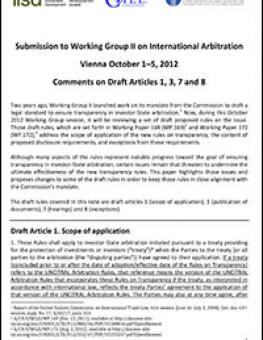
Submission to Working Group II on International Arbitration - Vienna October 1-5, 2012 - Comments on Draft Articles 1, 3, 7 and 8
In 2010, Working Group II on International Arbitration launched work on its mandate from the United Nations Commission on International Trade Law (UNCITRAL) to draft a legal standard to ensure transparency in investor-State arbitration.
The October 2012 Working Group session has reviewed a set of draft proposed rules aimed at addressing the scope of application of the new rules of transparency, the content of proposed disclosure requirements, and exceptions from those requirements. Although many aspects of the rules represent notable progress toward the goal of ensuring transparency in investor-State arbitration, certain issues remain that threaten to undermine the ultimate effectiveness of the new transparency rules. This paper highlights those issues and proposes changes to some of the draft rules in order to keep those rules in close alignment with the Commission's mandate.
You might also be interested in
Why the Energy Charter Treaty Modernization Doesn't Deliver for Climate
The Energy Charter Conference adopted the "modernized" Energy Charter Treaty (ECT) on December 3, 2024. IISD's Lukas Schaugg explains what the modernization does, when it will enter into force, its tension with EU law, and why the reformed ECT can still hinder climate policies.
The Responsible Agricultural Investment Tool for Agribusiness and Case Studies
This report summarizes a collaboration to support agribusinesses in complying with principles of responsible investment in agriculture and food systems.
Stabilization Clauses: The hidden provisions that can hinder tax and investment policy reform
Stabilization clauses should no longer automatically be included in contracts between states and investors. If they are, they should, at a minimum, build on the latest international standards on stabilization to avoid being a barrier to sustainable development.
What Drives Investment Policy-makers in Developing Countries to Use Tax Incentives?
The article explores the reasons behind the use of tax incentives in developing countries to attract investment, examining the pressures, challenges, and alternative strategies that exist.